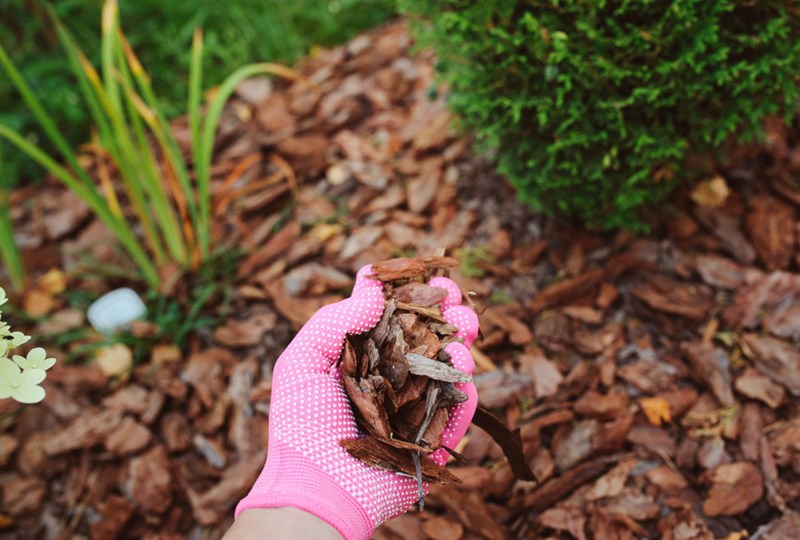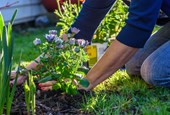
Key insights:
- Adding mulch to your landscaping can help prevent severe erosion.
- Organic mulch could be better for your flowers and soil, but inorganic mulch may require less maintenance.
- Mulch complements flowers throughout the growing season and covers dead plants during colder months.
Whether you’re a seasoned gardener or you’re starting your first landscaping project this year, you’ll need to get acquainted with mulch. Because mulch is an important gardening component, you’ll want insights on how to purchase and use mulch – along with these landscaping tips to freshen your yard.
Follow along to learn what type of mulch is best for your yard and how the right formula can upgrade your landscaping.
Mulch 101: What is it? What’s it made of?
Any type of material that is spread over soil as a covering is considered mulch. Mulch is used to aid in soil richness, prevent erosion and add aesthetic charm to your yard – and it provides a multitude of gardening benefits that we’ll get into later. When shopping for mulch, you’ll likely encounter two main categories: organic mulch and inorganic mulch.
Types of organic mulch include:
- Bark, shredded or chipped
- Compost
- Grass clippings or leaves
- Straw
- Newspaper
Types of inorganic mulch include:
- Rubber
- Landscaping fabric
- Stone
- Gravel
Why the type of mulch you use matters
Both organic and inorganic mulch have various benefits and considerations. And, depending on the type of yard work you plan to do, certain mulches may work better for you.
Typically, organic mulch is set apart from inorganic mulch due to its ability to add richness to the soil below as it decomposes. For this reason, organic mulch must be replaced over time. If you choose to use organic mulch, keep in mind that drier and woodier components will last longer in your garden.
Inorganic mulch, on the other hand, is great at holding in moisture and keeping out weeds. This type of mulch doesn’t need the continuous upkeep required by most organic mulches, but synthetic materials won’t add any fertility to the existing soil in your yard.
Mulch that helps prevent erosion
No matter what type of mulch you choose, your lawn will reap functional benefits from the mulch. Mulch specifically improves your yard health by:
- Retaining moisture in the soil
- Keeping soil cool
- Suppressing weed growth
- Improving the ground quality
- Preventing erosion
Even if it appears as though your yard doesn’t have much slope, water and wind can still initiate erosion. By using preventative measures, like adding mulch to your landscaping, you can decrease the likelihood of erosion in your yard. Mulch will absorb any effects of weather before it has a chance to threaten the underlying garden.
Increase your curb appeal with mulch
In some cases, mulch can be used simply for aesthetic purposes. For example, rubber mulch can line the area around your backyard playground to create a unique visual contrast between the synthetic mulch and natural grass. Or, incorporate mulch around a patio to enhance your inviting outdoor space.
Additionally, hardwood mulch can add curb appeal to a front yard garden. Purchase more hardwood mulch than you need to fill your garden in the spring. Then, when the temperatures cool down and flowers begin to die off in the fall, completely cover your landscaped area with the extra mulch. This extra layer of protection acts as a sort of insulation for the ground, and the soil doesn’t freeze as deeply. When the next spring rolls around, remove excess mulch from around your flowers to give them the space they need to grow again.
Time to mulch
Some landscaping trends come and go, but mulch will always remain a gardening and landscaping staple. From its functionality to its visual appeal, mulch is a universal way to upgrade your garden. Plus, the variety of organic and inorganic mulches provide homeowners with plenty of options to diversify the elements in their yards.
Moving forward, if you’re interested in learning more about landscaping trends or increasing your curb appeal, reach out to Edina Realty or one of our agents for additional help.










 Equal Housing Lender | Prosperity Home Mortgage, LLC may operate as Prosperity Home Mortgage, LLC dba Edina Realty Mortgage in Minnesota and Wisconsin. ©2024 Prosperity Home Mortgage, LLC dba Edina Realty Mortgage. (877) 275-1762. 3060 Williams Drive, Suite 600, Fairfax, VA 22031. All first mortgage products are provided by Prosperity Home Mortgage, LLC. Not all mortgage products may be available in all areas. Not all borrowers will qualify. NMLS ID #75164 (For licensing information go to: NMLS Consumer Access at http://www.nmlsconsumeraccess.org/) Licensed by the Department of Financial Protection and Innovation under the California Residential Mortgage Lending Act. Licensed by the Delaware State Bank Commissioner. Georgia Residential Mortgage Licensee. Massachusetts Mortgage Lender and Mortgage Broker MC75164. Licensed by the NJ Department of Banking and Insurance. Licensed Mortgage Banker-NYS Department of Financial Services. Rhode Island Licensed Lender. Rhode Island Licensed Loan Broker. Rhode Island Licensed Third-Party Loan Servicer. Also licensed in AK, AL, AR, AZ, CO, CT, DC, FL, ID, IL, IN, KS, KY, LA, MD, ME, MI, MN, MO, MS, MT, NC, ND, NE, NH, NM, NV, OH, OK, OR, PA, SC, SD, TN, TX, UT, VA, VT, WA, WI, WV and WY.
Equal Housing Lender | Prosperity Home Mortgage, LLC may operate as Prosperity Home Mortgage, LLC dba Edina Realty Mortgage in Minnesota and Wisconsin. ©2024 Prosperity Home Mortgage, LLC dba Edina Realty Mortgage. (877) 275-1762. 3060 Williams Drive, Suite 600, Fairfax, VA 22031. All first mortgage products are provided by Prosperity Home Mortgage, LLC. Not all mortgage products may be available in all areas. Not all borrowers will qualify. NMLS ID #75164 (For licensing information go to: NMLS Consumer Access at http://www.nmlsconsumeraccess.org/) Licensed by the Department of Financial Protection and Innovation under the California Residential Mortgage Lending Act. Licensed by the Delaware State Bank Commissioner. Georgia Residential Mortgage Licensee. Massachusetts Mortgage Lender and Mortgage Broker MC75164. Licensed by the NJ Department of Banking and Insurance. Licensed Mortgage Banker-NYS Department of Financial Services. Rhode Island Licensed Lender. Rhode Island Licensed Loan Broker. Rhode Island Licensed Third-Party Loan Servicer. Also licensed in AK, AL, AR, AZ, CO, CT, DC, FL, ID, IL, IN, KS, KY, LA, MD, ME, MI, MN, MO, MS, MT, NC, ND, NE, NH, NM, NV, OH, OK, OR, PA, SC, SD, TN, TX, UT, VA, VT, WA, WI, WV and WY.